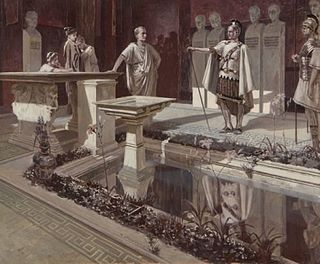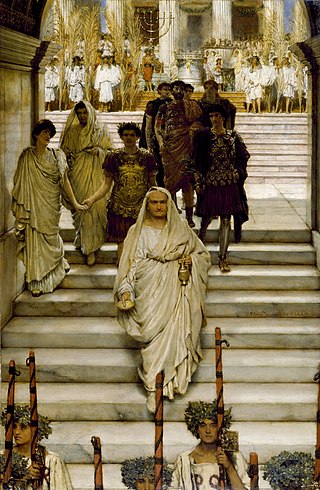Related Research Articles

Vespasian was a Roman emperor who reigned from AD 69 to 79. The fourth and last emperor who reigned in the Year of the Four Emperors, he founded the Flavian dynasty that ruled the Empire for 27 years. His fiscal reforms and consolidation of the empire generated political stability and a vast Roman building program.

Aulus Plautius was a Roman politician and general of the mid-1st century. He began the Roman conquest of Britain in 43, and became the first governor of the new province, serving from 43 to 46 CE.

The Year of the Four Emperors, AD 69, was the first civil war of the Roman Empire, during which four emperors ruled in succession: Galba, Otho, Vitellius, and Vespasian. It is considered an important interval, marking the transition from the Julio-Claudians, the first imperial dynasty, to the Flavian dynasty. The period witnessed several rebellions and claimants, with shifting allegiances and widespread turmoil in Rome and the provinces.

The Flavian dynasty ruled the Roman Empire between AD 69 and 96, encompassing the reigns of Vespasian (69–79), and his two sons Titus (79–81) and Domitian (81–96). The Flavians rose to power during the civil war of 69, known as the Year of the Four Emperors. After Galba and Otho died in quick succession, Vitellius became emperor in mid 69. His claim to the throne was quickly challenged by legions stationed in the Eastern provinces, who declared their commander Vespasian emperor in his place. The Second Battle of Bedriacum tilted the balance decisively in favour of the Flavian forces, who entered Rome on 20 December. The following day, the Roman Senate officially declared Vespasian emperor of the Roman Empire, thus commencing the Flavian dynasty. Although the dynasty proved to be short-lived, several significant historic, economic and military events took place during their reign.
Gaius Licinius Mucianus was a Roman general, statesman and writer. He is considered to have played a role behind the scenes in the elevation of Vespasian to the throne.
The Battle of Bedriacum refers to two battles fought during the Year of the Four Emperors near the village of Bedriacum, about 35 kilometers (22 mi) from the town of Cremona in northern Italy. The fighting in fact took place between Bedriacum and Cremona, and the battles are sometimes called "First Cremona" and "Second Cremona".
Lucius Antonius Saturninus was a Roman senator and general during the reign of Vespasian and his sons. While governor of the province called Germania Superior, motivated by a personal grudge against Emperor Domitian, he led a rebellion known as the Revolt of Saturninus, involving the legions Legio XIV Gemina and Legio XXI Rapax, camped in Moguntiacum (Mainz).
Titus Flavius T. f. T. n. Sabinus was a Roman politician and soldier. A native of Reate, he was the elder son of Titus Flavius Sabinus and Vespasia Polla, and brother of the Emperor Vespasian.
Lucius Salvius Otho Titianus was the elder brother of the Roman Emperor Otho. As a Roman senator, he was consul in the year 52 as the colleague of Faustus Cornelius Sulla Felix, and appointed consul as his brother's colleague for the period from Galba's murder to the end of February. Titianus was given the daily responsibilities of the emperor by Otho when Otho left Rome to halt the advance of Vitellius into Italy. Subsequently, Titianus was appointed generalissimo in charge of the war by Otho and was present at the First Battle of Bedriacum.
The gens Vitellia was a family of ancient Rome, which rose from obscurity in imperial times, and briefly held the Empire itself in AD 69. The first of this gens to obtain the consulship was Aulus Vitellius, uncle of the emperor Vitellius, in AD 32.

Nerva was Roman emperor from 96 to 98. Nerva became emperor when aged almost 66, after a lifetime of imperial service under Nero and the succeeding rulers of the Flavian dynasty. Under Nero, he was a member of the imperial entourage and played a vital part in exposing the Pisonian conspiracy of 65. Later, as a loyalist to the Flavians, he attained consulships in 71 and 90 during the reigns of Vespasian and Domitian, respectively. On 18 September 96, Domitian was assassinated in a palace conspiracy involving members of the Praetorian Guard and several of his freedmen. On the same day, Nerva was declared emperor by the Roman Senate. As the new ruler of the Roman Empire, he vowed to restore liberties which had been curtailed during the autocratic government of Domitian.

The gens Antonia was a Roman family of great antiquity, with both patrician and plebeian branches. The first of the gens to achieve prominence was Titus Antonius Merenda, one of the second group of Decemviri called, in 450 BC, to help draft what became the Law of the Twelve Tables. The most prominent member of the gens was Marcus Antonius.
Fabius Valens of Anagnia was a Roman commander favoured by Nero. Valens was an undisciplined character but not without talent; he tried to portray himself as witty by behaving frivolously.
Pompeius Silvanus, fully Marcus Pompeius Silvanus Staberius Flavinus or Flavianus, was a Roman senator who was consul twice.
Gaius Dillius Aponianus was a Roman senator and general, who played a role in the Year of Four Emperors. Aponianus ended up supporting Vespasian, and as a reward he was appointed suffect consul during the early years of that emperor.
Marcus Aponius Saturninus was a Senator of Imperial Rome, active in the latter half of the first century AD. His parents, also of senatorial rank, were wealthy and owned property in Egypt. He appears in the Acta Arvalia in the year 57 AD; classicist Ronald Syme suggests that he was made a member of the Arval Brethren due to the influence of Annaeus Seneca. Saturninus is mentioned as being present in 66 for sacrifices on the Capitol with the emperor Nero. Tacitus calls him a consul, but the date of his office is uncertain. He may have been consul in 55; Classical scholar Paul Gallivan at the University of Tasmania has argued that Saturninus was suffect consul between 63 and 66, by which time he was recorded as becoming promagister.
Lucius Tettius Julianus was a Roman general who held a number of imperial appointments during the Flavian dynasty. He was suffect consul for the nundinium of May–June 83 with Terentius Strabo Erucius Homullus as his colleague.
Publius Sallustius Blaesus was a Roman senator active during the last half of the first century AD. He was suffect consul for the nundinium May to August 89 with Marcus Peducaeus Saenianus as his colleague. Despite his social rank, Blaesus is a shadowy figure about whom scholars have made numerous sumises.
The gens Rubria was a plebeian family at ancient Rome. Members of this gens are first mentioned in the time of the Gracchi, but they did not rise to prominence until imperial times. The first of the Rubrii to obtain the consulship was Rubrius Gallus, some time before AD 68.
The gens Tampia was a minor plebeian family at ancient Rome. Members of this gens are first mentioned in history during the time of Nero, but few achieved any distinction in the Roman state. The nomen Tampius is easily confused with that of Ampius. The most illustrious of the Tampii was Lucius Tampius Flavianus, who held the consulship twice during the latter half of the first century.
References
- ↑ Giuseppe Camodeca, "Novità sui fasti consolari delle tavolette cerate della Campania", Publications de l'École française de Rome, 143 (1991), pp. 52, 70
- ↑ Paul Gallivan, "The Fasti for the Reign of Claudius", Classical Quarterly , 28 (1978), pp. 408, 424
- ↑ CIL X, 6225
- ↑ Pliny, Natural History, II.96
- 1 2 Milns, "The Career of M. Aponius Saturninus", Historia: Zeitschrift für Alte Geschichte , 22 (1973), p. 285
- ↑ Tacitus, Histories , II.86; III.4,10
- ↑ Tacitus, Histories, V.26
- ↑ Tacitus, Histories, II.86
- ↑ Tacitus, Histories, III.10
- ↑ Frontinus, De Aquis, 102